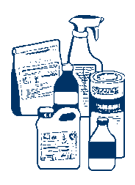Although pesticides can be beneficial to society, they can be dangerous
if used carelessly or if they are not stored properly and out of the reach
of children. According to data collected from the American Association
of Poison Control Centers, in 1993 alone, an estimated 80,000 children
were involved in common household pesticide-related poisonings or exposures
in the United States.
A survey by the U.S. Environmental Protection Agency regarding pesticides
used in and around the home revealed some significant findings:
- Almost half, 47%, of all households with children under the age of
five had at least one pesticide stored in an unlocked cabinet, less than
4 feet off the ground (i.e., within the reach of children).
- Approximately 75% of households without children under the age of five
also stored pesticides in an unlocked cabinet, less than 4 feet off the
ground (i.e., within the reach of children). This number is especially
significant because 13% of all pesticide poisoning incidents occur in homes
other than the child's home.
Bathrooms and kitchens were cited as the areas in the home most likely
to have improperly stored pesticides. Examples of some common household
pesticides found in bathrooms and kitchens include roach sprays; chlorine
bleach; kitchen and bath disinfectants; rat poison; insect and wasp sprays,
repellents and baits; and, flea and tick shampoos and dips for pets. Other
household pesticides include swimming pool chemicals and weed killers.
EPA has important regulatory authority over pesticides in the United
States under the pesticide law known as the Federal Insecticide, Fungicide,
and Rodenticide Act, or FIFRA. Since 1981, the law has required most residential-use
pesticides with a signal word of "Danger" or "Warning"
to be in child-resistant packaging. These are the pesticides which are
most toxic to children. Child-resistant packaging is designed to prevent
most children under the age of five from gaining access to the pesticide,
or at least delay their access. However, individuals must also take precautions
to protect children from accidental pesticide poisonings or exposures.
RECOMMENDATIONS FOR PREVENTING ACCIDENTAL EXPOSURE OR
POISONING:

- Always store pesticides away from children's reach in a locked
cabinet or garden shed. Child-proof safety latches may also be installed
on cabinets and can be purchased at your local hardware store;
- Always read the label first and follow the directions to the
letter, including all precautions and restrictions;
- Before applying pesticides (indoors or outdoors), always remove
children and their toys as well as pets from the area and keep them away
until the pesticide has dried or as long as is recommended by the label;
- If your use of a pesticide is interrupted (perhaps by a phone call),
always make sure to leave the container out of the reach of children
while you are gone;
- Never transfer pesticides to other containers that children
may associate with food or drink;
- Use child-resistant packaging properly by always closing the
container tightly after use;

- Never place rodent or insect baits where small children can
get to them;
- Alert others to the potential hazard of pesticides, especially caregivers
and grandparents;
- Teach children that "pesticides are poisons" and something
they should not touch;
- Keep the telephone number of your area Poison Control Center near your
telephone. (National Poison Center - 1-800-222-1222)
IN CASE OF AN EMERGENCY, try to determine what the child was
exposed to and what part of the body was affected before you take action,
since taking the right action is as important as taking immediate action.
The pesticide product label provides you with a "Statement of Treatment"
to follow in emergencies. Administer the indicated initial first aid; then
contact your local Poison Control Center, physician, local emergency number
(911 in most areas), or the operator.
The following require immediate attention before calling for assistance
- remember, act fast because speed is crucial:
- Swallowed Pesticide - Induce vomiting ONLY if the emergency
personnel on the phone tell you to do so. It will depend on what the child
has swallowed; some petroleum products or caustic poisons will cause more
damage if the child is made to vomit. Always keep Syrup of Ipecac on hand
(one ounce for each child in the household) to use to induce vomiting if
recommended by the emergency personnel. Be sure the date on the product
is current.
- Pesticide In Eye - Eye membranes absorb pesticides faster
than any other external part of the body; eye damage can occur in a few
minutes with some types of pesticides. If pesticide splashes into an eye,
hold the eyelid open and wash quickly and gently with clean running water
from the tap or a gentle stream from a hose for at least 15 minutes. If
possible, have someone else contact a Poison Control Center for you while
the victim is being treated. Do not use eye drops or chemicals or drugs
in the wash water.
- Pesticide On Skin - If pesticide splashes on the skin,
drench area with water and remove contaminated clothing. Wash skin and
hair thoroughly with soap and water. Later, discard contaminated clothing
or thoroughly wash it separately from other laundry.
- Inhaled Pesticide - Carry or drag victim to fresh air
immediately. (If proper protection is unavailable to you, call for emergency
equipment from the Fire Department.) Loosen victim's tight clothing. If
the victim's skin is blue or the victim has stopped breathing, give artificial
respiration and call rescue service for help. Open doors and windows so
no one else will be poisoned by fumes.
Additional pesticide product information can be obtained from the National
Pesticide Telecommunications Network (NPTN) at 1-800-858-7378. NPTN
is a toll-free information service funded by EPA and operated by the Oregon
State University Monday through Friday 9:30 a.m. - 7:30 p.m. Eastern Standard
Time.